Module 2 Unit 1 I've also entered a lot of competitions课件(共52张PPT)外研版英语八年级下册
文档属性
| 名称 | Module 2 Unit 1 I've also entered a lot of competitions课件(共52张PPT)外研版英语八年级下册 |  | |
| 格式 | pptx | ||
| 文件大小 | 8.3MB | ||
| 资源类型 | 教案 | ||
| 版本资源 | 外研版 | ||
| 科目 | 英语 | ||
| 更新时间 | 2024-09-18 19:11:29 | ||
图片预览



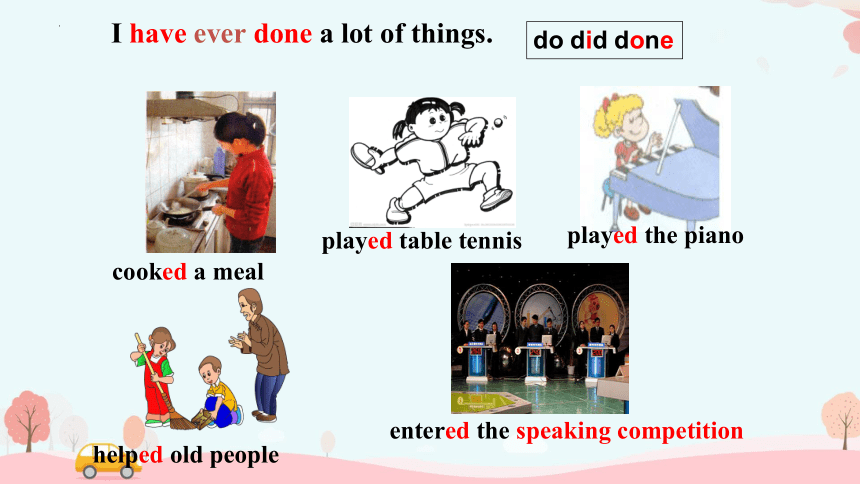
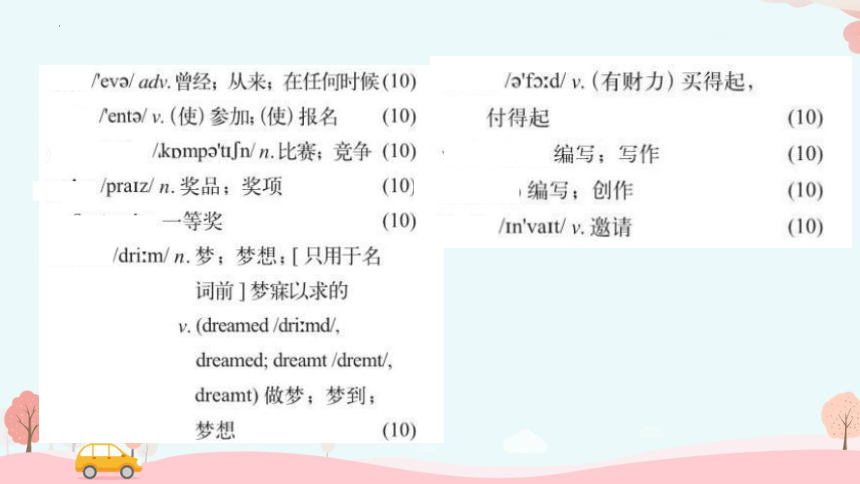
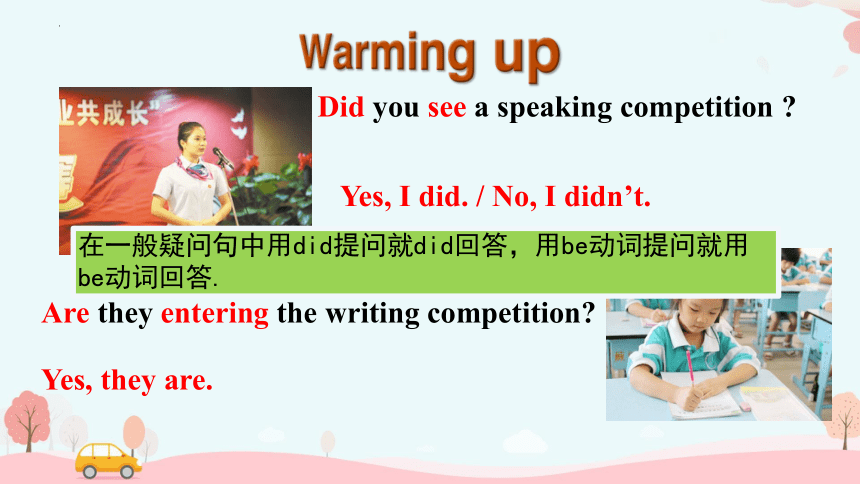


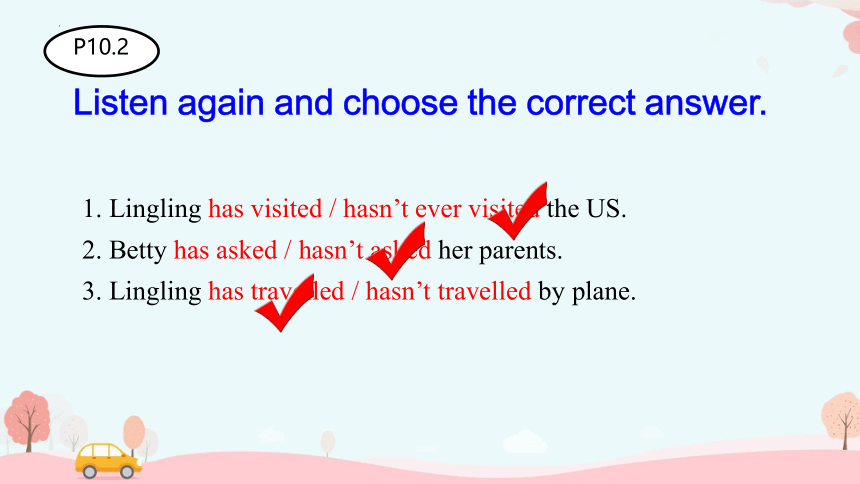
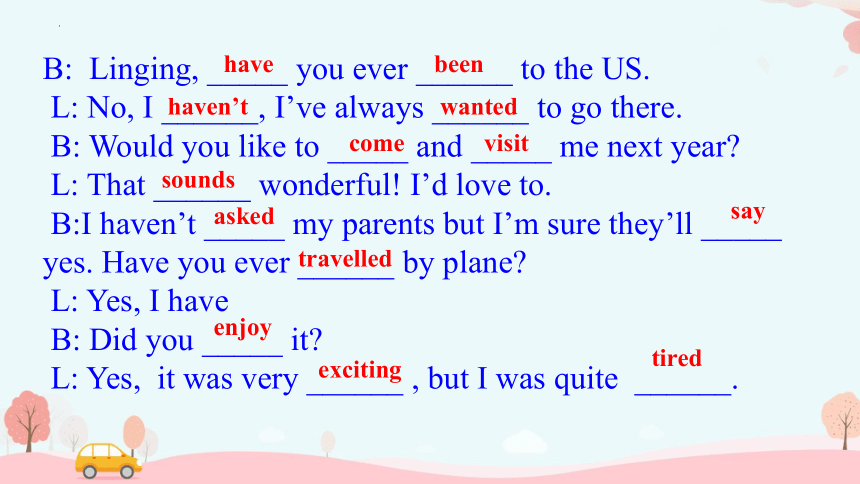
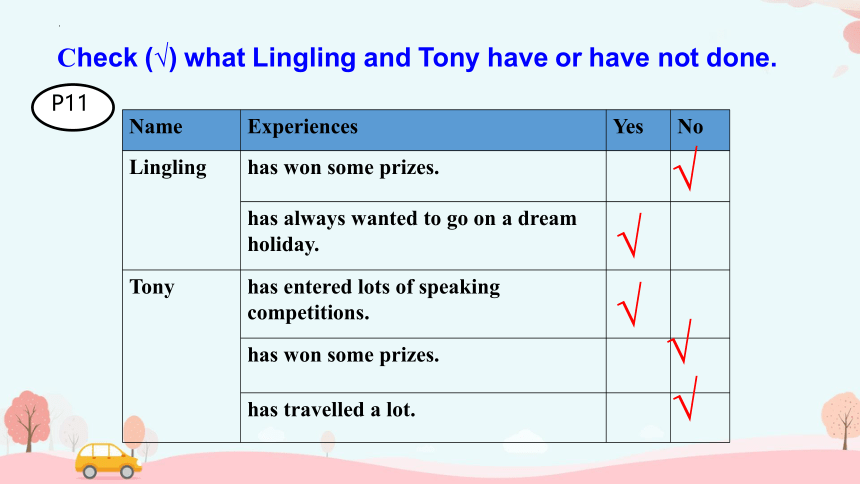
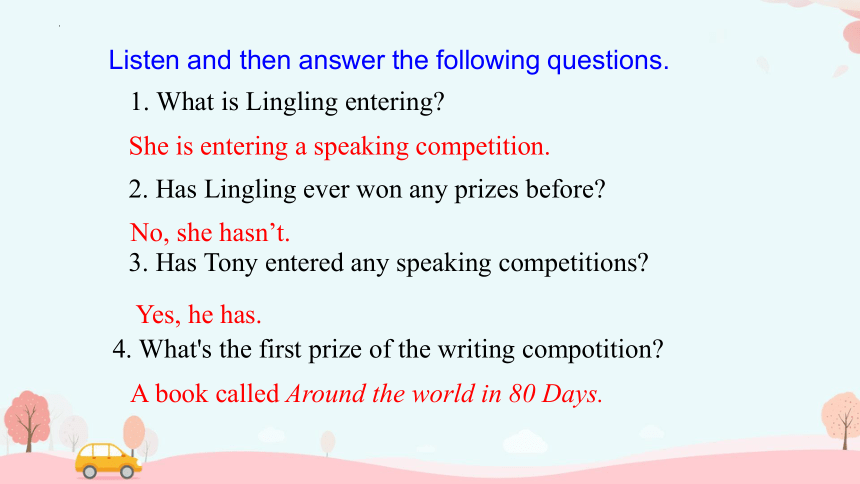
文档简介
(共52张PPT)
Unit 1
I've also entered lots of
speaking competitions.
Module 2 Experiences
Do you like travelling
I have ever visited… ,but I haven’t visited ….
Make sentences
Yandang Moutain
Qiandao Lake
The Forbidden City
The Summer Palace
San Ya
Beihai Park
played table tennis
entered the speaking competition
helped old people
cooked a meal
played the piano
I have ever done a lot of things.
do did done
Did you see a speaking competition
Yes, I did. / No, I didn’t.
Are they entering the writing competition
Yes, they are.
在一般疑问句中用did提问就did回答,用be动词提问就用be动词回答.
Have you entered a speaking competition
Yes, I have. / No, I haven't.
Listen and number the words as you hear them.
ever
exciting
tired
visit
wonderful
1
4
5
2
3
P10.1
Listen again and choose the correct answer.
1. Lingling has visited / hasn’t ever visited the US.
2. Betty has asked / hasn’t asked her parents.
3. Lingling has travelled / hasn’t travelled by plane.
P10.2
B: Linging, _____ you ever ______ to the US.
L: No, I ______, I’ve always ______ to go there.
B: Would you like to _____ and _____ me next year
L: That ______ wonderful! I’d love to.
B:I haven’t _____ my parents but I’m sure they’ll _____ yes. Have you ever ______ by plane
L: Yes, I have
B: Did you _____ it
L: Yes, it was very ______ , but I was quite ______.
have
been
haven’t
wanted
come
visit
sounds
asked
say
travelled
enjoy
exciting
tired
Name Experiences Yes No
Lingling has won some prizes.
has always wanted to go on a dream holiday.
Tony has entered lots of speaking competitions.
has won some prizes.
has travelled a lot.
√
√
√
√
√
Check (√) what Lingling and Tony have or have not done.
P11
1. What is Lingling entering
She is entering a speaking competition.
Listen and then answer the following questions.
2. Has Lingling ever won any prizes before
3. Has Tony entered any speaking competitions
No, she hasn’t.
Yes, he has.
4. What's the first prize of the writing compotition
A book called Around the world in 80 Days.
Listen and Repeat.
He has stopped ______ now. Lingling suggests Tony enter a writing competition. It needs to write a story about a place you’ve ______. Tony _____ Lingling to _____ with him if he wins the prize of the writing competition. But the first prize is only the ______ ______ Around the World 80 Days
Fill in the blanks according to the dialog. Then, retell the dialog.
Lingling is entering a speaking ___________. The _____ prize is “My dream holiday”. She hasn’t _____ any prizes before. She has always wanted to go on a dream holiday but she can’t _______ it. Tony has _____ entered lots of speaking competitions, but he hasn’t won any prizes.
competition
first
won
afford
ever
trying
visited
invites
book
called
travel
判断下列句子的时态
She works in a factory.
I was doing my homework at this time yesterday.
We are going to have a picnic this Sunday.
They held a sports meeting last week.
Are you doing your homework
名称 时间 动词形式
一般现在时 经常、反复、真理 1.v.原型 2.v.三单
现在进行时 正在进行 am/is/ are +ving
一般将来时 即将,计划 1.will+v.原型
2.be going to +动词原形
3.be+ving
一般过去时 过去 1.v-ed
2. 不规则动词
过去进行时 过去某一时间,正在进行 was/were+ving
现在完成时动词构成:
主语+have/has +v.过去分词
过去分词的规则变化
过去分词的不规则变化
I, finish, homework
肯定句
I have finished my homework.
否定句
I haven't finished my homework.
Have you finished your homework
Yes, I have./ No, I haven't.
疑问句
同步练习册P9 句型转换
现在完成时的主要用法
表示过去发生的某一动作对现在造成的影响或结果。
表示过去已经开始,持续到现在的动作或状态。
1.表示过去发生的某一动作对现在造成的影响或结果。(常与just, already, yet,ever, never,before 连用,强调过去的动作和现在的联系,不强调动作的延续,肯定句用already, 疑问句用yet)
--It 's so dark.
--Someone has turned off the light.
I've finished my homework.
already--yet
already 用于肯定句中,yet 用于疑问句和否定句中
A: your brother his homework yet (finish)
B: Yes, he's already done it.
Has
finished
ever--never
ever 曾经, 用于疑问句中;never 从不, 带有否定意义
A: you ever to the park (be)
B: No, .
Have
been
never
just--just now
just 刚刚,与现在完成时连用,一般置于句中;
just now 刚才, 与一般过去时连用
I just the desk, you can take it to your classroom. (mend)
have
mended
2.动作开始在过去,持续到现在甚至将来,通常和for 或since 引导的时间状语连用
I have lived here for 4 years.
I have lived here since 2017/ 4 years ago.
(since +过去的时间点; for +一段时间)
我已经学了10多年的英语。
I have learned English for more than 10 years.
I have learned English since 10 years ago.
since 后面带过去时间或有一般过去时的句子
Tom hasn't played basketball since he left school ten years ago.
自从十年前离开学校, 汤姆就没打过篮球。
since +时间点
自1994年以来我们一直住在这里。
We've lived here since 1994.
for + 时间段
我们认识已有十年。
We have known each other for 10 years.
so far
目前为止,我们已经中了100棵树。
We have planted 100 trees so far.
in the past 10 years, twice
have been 与 have gone
have been to 表示曾经去过某处,但现在人不在那。
have gone to 表示已经去了某地,现在人可能在去的途中或已在那了。
have been in 呆在某处一段时间。
Has she ever been to Nanjing
You have never been there, have you
I have been to Guilin.
She has gone to Nanjing.
Mike and his parents in the north for half a year.
Mum is not at home now. She the shop.
you ever Kunming --Never.
Where you these days
We Beijing twice.
have been in
has gone to
Have
been to
have
been
have been to
用have been to, have gone to, have been in 填空
一些动词不能和 for 或 since 连用。
He has bought the book.
He has bought the book for a week.
He has had the book for a week.
She has bought the Huawei Phone for two years.
How long have you come to the Xi'an
Mr. Zhang has gone to China since three months ago.
I have left Haikou for eight years.
I have borrowed the dictionary since 3 days ago.
The film has begun for 10 minutes.
The concert has finished for half an hour.
His dog has died for two years.
找出错误并改正
时间标志词
写出下列词语的过去式-过去分词
enter; visit; win; want; stop; think; write; make;dream
一等奖;邀请某人做某事;考虑;演讲比赛;创作,编造
你之前得过奖吗?(得奖)
我一直都想有一个梦想假期,但我支付不起。(梦想;支付得起)
你需要写一篇自己去过的地方的短文。(编写)
一、现在完成时的句式
1. 肯定句式:“主语+have / has+动词的过去分词+其他”。如:
They have found the hotel.
Sue has visited the Great Wall.
2. 否定句式:“主语+have / has +not+动词的过去分词+其他”
(have not 和has not可分别缩写为haven’t和hasn’t)。如:
They haven’t found the hotel.
Sue hasn’t visited the Great Wall.
3. 一般疑问句式:“Have / Has+主语+动词的过去分词+其他 ”。
肯定回答为“Yes, 主语(人称代词)+have / has.”,
否定回答为“No, 主语(人称代词)+haven’t / hasn’t.”。如:
(1) —Have they found the hotel
—Yes, they have. / No, they haven’t.
(2) —Has Sue visited the Great Wall
—Yes, she has. / No, she hasn’t.
二、动词过去分词的变化规律
规则动词过去分词的变化规律与规则动词过去式的变化规律相同。
1. 一般动词词尾加-ed。如:
work →worked → worked
2. 以“不发音的字母e”结尾的动词后加-d。如:
cause → caused → caused
3. 以“辅音字母+y”结尾的动词,先将y变为i,再加-ed。如:
cry → cried → cried
4. 以“元音字母+一个辅音字母”结尾的重读闭音节动词,先双写该辅音字母,再加-ed。如:
plan → planned → planned
stop → stopped→stopped
注:不规则动词的过去分词的变化需特别记忆。
e.g.1. be → was/ were → been
2. do →did → done 7. eat→ ate → eaten
3. go→ went → gone 8. see→ saw → seen
4. find→ found → found 9. have→ had → had
5. make→ made → made 10. let→ let → let
6. put→ put → put
Ⅲ. 根据括号内的要求完成下列各题,每空一词(含缩略形式)。
1. I’ve visited Mr Smith twice. (改为一般疑问句)
________ ________ ________ Mr Smith twice
2. Ms Jones has bought some red clothes. (改为否定句)
Ms Jones ________ ________ ________ red clothes.
Have you visited
hasn’t bought any
3. —Has your mother called Mrs Black (作肯定回答)
—________, ________ ________.
4. The Greens will take a plane to travel. (改为同义句)
The Greens will travel _______ ________.
5. Tony is buying a ticket to the match. (对划线部分提问)
________ ________ Tony ________
Yes she has
by plane
What is doing
现在完成时(1)
现在完成时表示在以前某个时间已经发生的行为或曾经做过的事情对目前有某种影响,也可以表示到目前为止已经完成的事情。谓语部分由“have / has+动词的过去分词”构成(第三人称单数形式用has, 其他人称用have)。
动词的过去分词形式
Unit 1
I've also entered lots of
speaking competitions.
Module 2 Experiences
Do you like travelling
I have ever visited… ,but I haven’t visited ….
Make sentences
Yandang Moutain
Qiandao Lake
The Forbidden City
The Summer Palace
San Ya
Beihai Park
played table tennis
entered the speaking competition
helped old people
cooked a meal
played the piano
I have ever done a lot of things.
do did done
Did you see a speaking competition
Yes, I did. / No, I didn’t.
Are they entering the writing competition
Yes, they are.
在一般疑问句中用did提问就did回答,用be动词提问就用be动词回答.
Have you entered a speaking competition
Yes, I have. / No, I haven't.
Listen and number the words as you hear them.
ever
exciting
tired
visit
wonderful
1
4
5
2
3
P10.1
Listen again and choose the correct answer.
1. Lingling has visited / hasn’t ever visited the US.
2. Betty has asked / hasn’t asked her parents.
3. Lingling has travelled / hasn’t travelled by plane.
P10.2
B: Linging, _____ you ever ______ to the US.
L: No, I ______, I’ve always ______ to go there.
B: Would you like to _____ and _____ me next year
L: That ______ wonderful! I’d love to.
B:I haven’t _____ my parents but I’m sure they’ll _____ yes. Have you ever ______ by plane
L: Yes, I have
B: Did you _____ it
L: Yes, it was very ______ , but I was quite ______.
have
been
haven’t
wanted
come
visit
sounds
asked
say
travelled
enjoy
exciting
tired
Name Experiences Yes No
Lingling has won some prizes.
has always wanted to go on a dream holiday.
Tony has entered lots of speaking competitions.
has won some prizes.
has travelled a lot.
√
√
√
√
√
Check (√) what Lingling and Tony have or have not done.
P11
1. What is Lingling entering
She is entering a speaking competition.
Listen and then answer the following questions.
2. Has Lingling ever won any prizes before
3. Has Tony entered any speaking competitions
No, she hasn’t.
Yes, he has.
4. What's the first prize of the writing compotition
A book called Around the world in 80 Days.
Listen and Repeat.
He has stopped ______ now. Lingling suggests Tony enter a writing competition. It needs to write a story about a place you’ve ______. Tony _____ Lingling to _____ with him if he wins the prize of the writing competition. But the first prize is only the ______ ______ Around the World 80 Days
Fill in the blanks according to the dialog. Then, retell the dialog.
Lingling is entering a speaking ___________. The _____ prize is “My dream holiday”. She hasn’t _____ any prizes before. She has always wanted to go on a dream holiday but she can’t _______ it. Tony has _____ entered lots of speaking competitions, but he hasn’t won any prizes.
competition
first
won
afford
ever
trying
visited
invites
book
called
travel
判断下列句子的时态
She works in a factory.
I was doing my homework at this time yesterday.
We are going to have a picnic this Sunday.
They held a sports meeting last week.
Are you doing your homework
名称 时间 动词形式
一般现在时 经常、反复、真理 1.v.原型 2.v.三单
现在进行时 正在进行 am/is/ are +ving
一般将来时 即将,计划 1.will+v.原型
2.be going to +动词原形
3.be+ving
一般过去时 过去 1.v-ed
2. 不规则动词
过去进行时 过去某一时间,正在进行 was/were+ving
现在完成时动词构成:
主语+have/has +v.过去分词
过去分词的规则变化
过去分词的不规则变化
I, finish, homework
肯定句
I have finished my homework.
否定句
I haven't finished my homework.
Have you finished your homework
Yes, I have./ No, I haven't.
疑问句
同步练习册P9 句型转换
现在完成时的主要用法
表示过去发生的某一动作对现在造成的影响或结果。
表示过去已经开始,持续到现在的动作或状态。
1.表示过去发生的某一动作对现在造成的影响或结果。(常与just, already, yet,ever, never,before 连用,强调过去的动作和现在的联系,不强调动作的延续,肯定句用already, 疑问句用yet)
--It 's so dark.
--Someone has turned off the light.
I've finished my homework.
already--yet
already 用于肯定句中,yet 用于疑问句和否定句中
A: your brother his homework yet (finish)
B: Yes, he's already done it.
Has
finished
ever--never
ever 曾经, 用于疑问句中;never 从不, 带有否定意义
A: you ever to the park (be)
B: No, .
Have
been
never
just--just now
just 刚刚,与现在完成时连用,一般置于句中;
just now 刚才, 与一般过去时连用
I just the desk, you can take it to your classroom. (mend)
have
mended
2.动作开始在过去,持续到现在甚至将来,通常和for 或since 引导的时间状语连用
I have lived here for 4 years.
I have lived here since 2017/ 4 years ago.
(since +过去的时间点; for +一段时间)
我已经学了10多年的英语。
I have learned English for more than 10 years.
I have learned English since 10 years ago.
since 后面带过去时间或有一般过去时的句子
Tom hasn't played basketball since he left school ten years ago.
自从十年前离开学校, 汤姆就没打过篮球。
since +时间点
自1994年以来我们一直住在这里。
We've lived here since 1994.
for + 时间段
我们认识已有十年。
We have known each other for 10 years.
so far
目前为止,我们已经中了100棵树。
We have planted 100 trees so far.
in the past 10 years, twice
have been 与 have gone
have been to 表示曾经去过某处,但现在人不在那。
have gone to 表示已经去了某地,现在人可能在去的途中或已在那了。
have been in 呆在某处一段时间。
Has she ever been to Nanjing
You have never been there, have you
I have been to Guilin.
She has gone to Nanjing.
Mike and his parents in the north for half a year.
Mum is not at home now. She the shop.
you ever Kunming --Never.
Where you these days
We Beijing twice.
have been in
has gone to
Have
been to
have
been
have been to
用have been to, have gone to, have been in 填空
一些动词不能和 for 或 since 连用。
He has bought the book.
He has bought the book for a week.
He has had the book for a week.
She has bought the Huawei Phone for two years.
How long have you come to the Xi'an
Mr. Zhang has gone to China since three months ago.
I have left Haikou for eight years.
I have borrowed the dictionary since 3 days ago.
The film has begun for 10 minutes.
The concert has finished for half an hour.
His dog has died for two years.
找出错误并改正
时间标志词
写出下列词语的过去式-过去分词
enter; visit; win; want; stop; think; write; make;dream
一等奖;邀请某人做某事;考虑;演讲比赛;创作,编造
你之前得过奖吗?(得奖)
我一直都想有一个梦想假期,但我支付不起。(梦想;支付得起)
你需要写一篇自己去过的地方的短文。(编写)
一、现在完成时的句式
1. 肯定句式:“主语+have / has+动词的过去分词+其他”。如:
They have found the hotel.
Sue has visited the Great Wall.
2. 否定句式:“主语+have / has +not+动词的过去分词+其他”
(have not 和has not可分别缩写为haven’t和hasn’t)。如:
They haven’t found the hotel.
Sue hasn’t visited the Great Wall.
3. 一般疑问句式:“Have / Has+主语+动词的过去分词+其他 ”。
肯定回答为“Yes, 主语(人称代词)+have / has.”,
否定回答为“No, 主语(人称代词)+haven’t / hasn’t.”。如:
(1) —Have they found the hotel
—Yes, they have. / No, they haven’t.
(2) —Has Sue visited the Great Wall
—Yes, she has. / No, she hasn’t.
二、动词过去分词的变化规律
规则动词过去分词的变化规律与规则动词过去式的变化规律相同。
1. 一般动词词尾加-ed。如:
work →worked → worked
2. 以“不发音的字母e”结尾的动词后加-d。如:
cause → caused → caused
3. 以“辅音字母+y”结尾的动词,先将y变为i,再加-ed。如:
cry → cried → cried
4. 以“元音字母+一个辅音字母”结尾的重读闭音节动词,先双写该辅音字母,再加-ed。如:
plan → planned → planned
stop → stopped→stopped
注:不规则动词的过去分词的变化需特别记忆。
e.g.1. be → was/ were → been
2. do →did → done 7. eat→ ate → eaten
3. go→ went → gone 8. see→ saw → seen
4. find→ found → found 9. have→ had → had
5. make→ made → made 10. let→ let → let
6. put→ put → put
Ⅲ. 根据括号内的要求完成下列各题,每空一词(含缩略形式)。
1. I’ve visited Mr Smith twice. (改为一般疑问句)
________ ________ ________ Mr Smith twice
2. Ms Jones has bought some red clothes. (改为否定句)
Ms Jones ________ ________ ________ red clothes.
Have you visited
hasn’t bought any
3. —Has your mother called Mrs Black (作肯定回答)
—________, ________ ________.
4. The Greens will take a plane to travel. (改为同义句)
The Greens will travel _______ ________.
5. Tony is buying a ticket to the match. (对划线部分提问)
________ ________ Tony ________
Yes she has
by plane
What is doing
现在完成时(1)
现在完成时表示在以前某个时间已经发生的行为或曾经做过的事情对目前有某种影响,也可以表示到目前为止已经完成的事情。谓语部分由“have / has+动词的过去分词”构成(第三人称单数形式用has, 其他人称用have)。
动词的过去分词形式
同课章节目录
- Module 1 Feelings and impressions
- Unit 1 It smells delicious.
- Unit 2 I feel nervous when I speak Chinese .
- Unit 3 Language in use
- Module 2 Experiences
- Unit 1 I've also entered lots of speaking competi
- Unit 2 They have seen the Pyramids.
- Unit 3 Language in use
- Module 3 Journey to space
- Unit 1 Has it arrived yet?
- Unit 2 We have not found life on any other planet
- Unit 3 Language in use
- Module 4 Seeing the docto
- Unit 1 I haven't done much exercise since I got m
- Unit 2 We have played football for a year now
- Unit 3 Language in use
- Module 5 Cartoons
- Unit 1 It's time to watch a cartoon.
- Unit 2 Tintin has been popular for over eighty yea
- Unit 3 Language in use
- Revision module A
- Module 6 Hobbies
- Unit 1 Do you collect anything ?
- Unit 2 Hobbies can make you grow as a person.
- Unit 3 Language in use
- Module 7 Summer in Los Angeles
- Unit 1 Please write to me and send me some photos
- Unit 2 Fill out a form and come to learn English
- Unit 3 Language in use
- Module 8 Time off
- Unit 1 I can hardly believe we are in the city ce
- Unit 2 We thought somebody was moving about
- Unit 3 Language in use
- Module 9 Friendship
- Unit 1 Could I ask if you've mentioned this to he
- Unit 2 I believe that the world is what you think
- Unit 3 Language in use
- Module 10 On the radio
- Unit 1 I hope that you can join us one day
- Unit 2 It seemed that they were speaking to me in
- Unit 3 Language in use
- Revision module B
